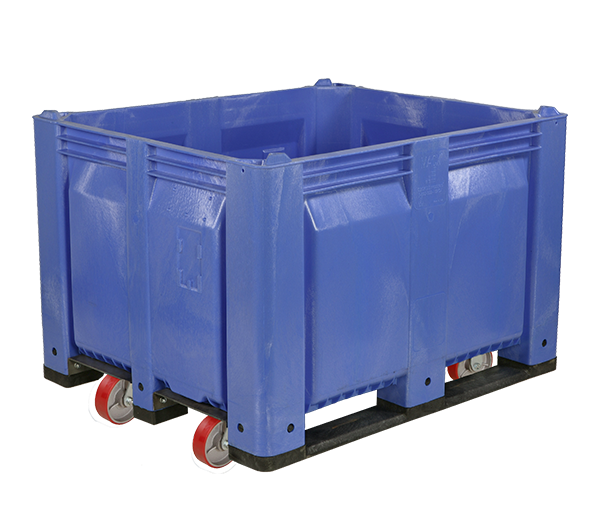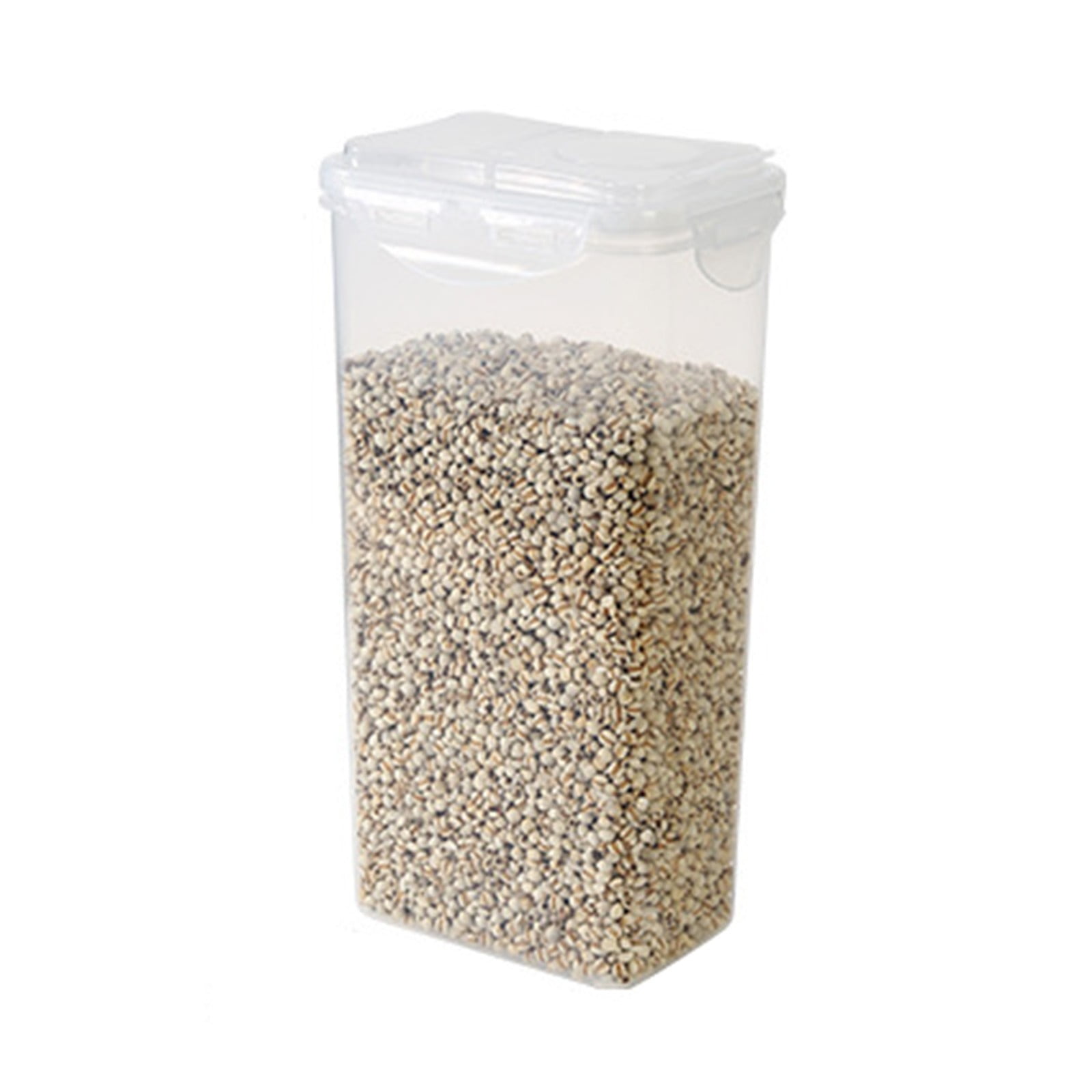Discover cost-effective ways to use Bulk Plastic Containers in industrial settings
The Function of Bulk Plastic Containers in Effective Recycling Practices and Sustainability
Bulk plastic containers are essential to modern-day recycling efforts. Their design enhances the effectiveness of material collection and transportation, adding to sustainability goals. These containers not just maximize area however additionally help in keeping an eye on contamination levels. Their application is not without difficulties. Comprehending the full scope of their impact reveals a complex partnership between logistics and environmental responsibility that necessitates more exploration.
Comprehending Mass Plastic Containers
Mass plastic containers offer as a crucial component in different sectors, promoting the storage space and transportation of items. These containers are generally made from durable materials such as high-density polyethylene (HDPE) or polypropylene, which provide sturdiness and resistance to environmental factors. Their layout typically includes functions like stackability and modularity, enabling reliable usage of space throughout both storage and transit.
Industries such as farming, food processing, and making often utilize mass plastic containers due to their light-weight nature and simplicity of handling. The containers come in numerous sizes and arrangements, satisfying the specific requirements of various items. Their convenience extends beyond plain performance; they can additionally be personalized with lids, takes care of, and classifying alternatives to improve usability - plastic bulk containers. Therefore, bulk plastic containers play an essential role in enhancing logistics and supply chain operations across several markets, thereby adding to total efficiency and cost-effectiveness
Benefits of Using Mass Plastic Containers in Recycling
The utilization of bulk plastic containers significantly enhances the performance of the process when companies focus on reusing initiatives. These containers are created to maximize space, allowing for the storage space and transport of larger quantities of recyclable products. This leads to fewer journeys to reusing facilities, consequently decreasing fuel usage and associated discharges.
Additionally, mass plastic containers are immune and resilient to numerous environmental elements, making certain that materials remain protected during handling and transit. Their lightweight layout further adds to decrease transportation expenses.
Furthermore, the harmony of these containers promotes much better sorting and handling of recyclable materials, which can improve general recycling prices - bulk plastic containers for sale. Organizations that adopt bulk plastic containers likewise show a commitment to sustainability, favorably affecting their brand name image. Inevitably, these advantages not only enhance recycling practices however likewise add to wider environmental goals
How Bulk Plastic Containers Facilitate Material Collection
Efficient product collection is significantly enhanced by the use of bulk plastic containers, as they give a structured and efficient solution for collecting recyclable items. These containers are developed to suit big quantities of materials, which streamlines the sorting and storage procedure. Their stackable layout optimizes room usage, making it easier for centers to arrange recyclables without clutter.
In addition, bulk plastic containers are weather-resistant and long lasting, permitting for exterior placement without deterioration. This durability guarantees that products remain safeguarded up until they are accumulated for handling.

The uniformity in shapes and size of these containers assists in standardization throughout collection factors, allowing better tracking of recyclable quantities. In addition, their transparent nature enables for easy visibility of components, helping in the tracking of contamination levels and guaranteeing that just appropriate products are gathered. Generally, bulk plastic containers play a critical duty in improving the product collection procedure, thereby advertising reliable recycling techniques.
Transportation Efficiency and Environmental Influence
Transport effectiveness plays a vital function in the recycling process, specifically with the optimization of load capability in bulk plastic containers. By making best use of the volume of material transported, companies can significantly reduce the number of trips needed, thus decreasing their carbon footprint. This strategy not only improves functional performance however likewise adds to extra lasting environmental practices.

Maximizing Lots Ability
Maximizing load capability is typically ignored, it plays a necessary duty in improving transport effectiveness and minimizing ecological effect in reusing methods. By making the most of the quantity that bulk plastic containers can hold, reusing procedures can reduce the number of journeys needed for transportation. This not just decreases fuel intake yet also decreases the damage on cars. Efficient lots monitoring permits facilities to utilize space successfully, guaranteeing that each transportation cycle is as efficient as possible. Furthermore, well-optimized loads can bring about much better negotiations with logistics suppliers, potentially decreasing general expenses. Eventually, improving load capacity adds to a more sustainable recycling system by promoting effective resource usage and decreasing waste produced during transportation.
Minimizing Carbon Impact
As recycling procedures venture to minimize their ecological effect, minimizing the carbon impact associated with transportation arises as an important objective. Bulk plastic containers play a crucial function in attaining this goal by boosting load efficiency and enhancing logistics. Their lightweight yet sturdy style permits maximum freight space application, minimizing the number of trips needed to deliver products. By settling deliveries, reusing centers can reduce gas consumption and greenhouse gas discharges. In enhancement, strategically situating recycling facilities reduces transportation distances, furthermore decreasing carbon results. Employing fuel-efficient cars and different energy resources enhances general sustainability. By incorporating these methods, the reusing industry can significantly decrease its carbon footprint, adding to an extra lasting future.
Difficulties in making use of Bulk Plastic Containers

Contamination Concerns
Contamination concerns stand for a considerable difficulty in the reliable use of mass plastic containers within reusing practices. These containers often gather deposits from previous materials, bring about mixed products that can prevent the reusing procedure. Pollutants such as food waste, chemicals, or non-recyclable materials can endanger the honesty of the whole batch, causing boosted disposal prices and lowered recycling rates. In addition, improper cleaning or sorting can intensify these problems, making it tough for reusing facilities to process products successfully. The visibility of pollutants not just affects the high quality of recycled items but likewise undermines the total sustainability initiatives targeted at reducing plastic waste. Resolving these contamination challenges is essential for enhancing the efficiency of mass plastic container recycling.
Recycling Framework Limitations
Inefficiency in recycling facilities positions considerable difficulties for the reliable administration of bulk plastic containers. Lots of reusing centers do not have the capability to process big quantities of these containers effectively, leading to increased delays and prices. Poor sorting innovations often lead to contamination, as bulk containers may be blended with various other materials, complicating the recycling process. Restricted transportation choices likewise prevent the activity of bulk plastic containers to ideal recycling facilities, causing raised landfill waste. Additionally, a lack of standard protocols for mass container recycling develops confusion amongst customers and organizations, additionally making complex efforts to promote sustainability. Attending to these framework limitations is vital to improve recycling techniques and maximize the possibility of bulk plastic containers in a round economy.
Best Practices for Carrying Out Bulk Plastic Containers
They must prioritize a calculated method that improves efficiency and decreases contamination dangers when organizations think about carrying out bulk plastic containers in their recycling practices. Picking the ideal container dimension and kind is crucial to accommodate the volume of products being refined. Organizations ought to also develop clear labeling and signage to direct users on appropriate disposal approaches, lessening complication and mistakes. Routine training sessions for staff can additionally reinforce these techniques, making certain every person understands their roles in preserving recycling stability.
Furthermore, organizations ought to apply a regular maintenance routine to check and tidy containers, protecting against the build-up of contaminants. Partnering with neighborhood reusing facilities can likewise enhance the collection procedure, making certain that materials are effectively refined. Finally, companies must keep track of and examine their recycling metrics, using this information to improve techniques bulk plastic containers for sale gradually and advertise continuous renovation in their sustainability efforts.
The Future of Mass Plastic Containers in Sustainable Practices
As companies increasingly prioritize sustainability, the duty of bulk plastic containers in reusing practices is readied to evolve substantially. Advancements in products scientific research are bring about the growth of recyclable and eco-friendly choices, enhancing the ecological benefits of bulk plastic containers. Furthermore, the application of closed-loop systems will certainly permit simpler collection and repurposing of these containers, minimizing waste and resource consumption.
Technical developments, such as smart radar, will enable firms to check the lifecycle of mass containers, improving performance in recycling processes. As customer demand for lasting practices grows, services will likely adopt mass plastic containers made for reuse and long-term value. Cooperation between federal governments and markets will foster the establishment of standardized reusing protocols, making sure that mass containers are properly incorporated into wider sustainability efforts. Generally, the future of mass plastic containers shows up promising, with significant potential for contributing to a round economy.
Regularly Asked Concerns
Exactly How Are Bulk Plastic Containers Made and What Materials Are Used?
Mass plastic containers are typically made from high-density polyethylene (HDPE) or polypropylene (PP) These products are processed through shot molding or strike molding strategies, resulting in sturdy, light-weight containers appropriate for numerous storage and transport requirements.
Can Bulk Plastic Containers Be Reused Several Times Before Recycling?
Yes, bulk plastic containers can be recycled several times before recycling. Their toughness and style permit for duplicated use in numerous applications, promoting sustainability and resource performance while lowering the requirement for new containers.

What Accreditations Exist for Bulk Plastic Containers in Recycling?
Various qualifications for bulk plastic containers include the Recycling Partnership's qualification, the Cradle to Cradle Certified ™ criterion, and the Sustainable Packaging Union's guidelines, ensuring containers satisfy certain environmental and recyclability standards for efficient recycling.
Just How Do Mass Plastic Containers Contrast to Other Recycling Storage Space Options?
Mass plastic containers provide greater resilience and capability contrasted to other reusing storage alternatives, reducing the danger of contamination and helping with efficient transport. Their layout supports far better organization, boosting overall efficiency in reusing operations.
What Is the Life-span of a Bulk Plastic Container in Recycling Processes?
The lifespan of a mass plastic container in recycling processes normally varies from 5 to 10 years, depending on use, material quality, and environmental conditions, permitting numerous cycles of usage before eventual disposal or recycling.
When organizations focus on reusing efforts, the use of mass plastic containers greatly improves the effectiveness of the process. Transport performance plays a vital function in the recycling process, especially via the optimization of lots ability in mass plastic containers. The usage of mass plastic containers in recycling methods encounters substantial challenges, particularly concerning contamination concerns and constraints within recycling infrastructure. Contamination concerns stand for a substantial obstacle in the effective use of bulk plastic containers within recycling techniques. When organizations consider implementing bulk plastic containers in their reusing techniques, they need to focus on a critical technique that improves performance and minimizes contamination dangers.